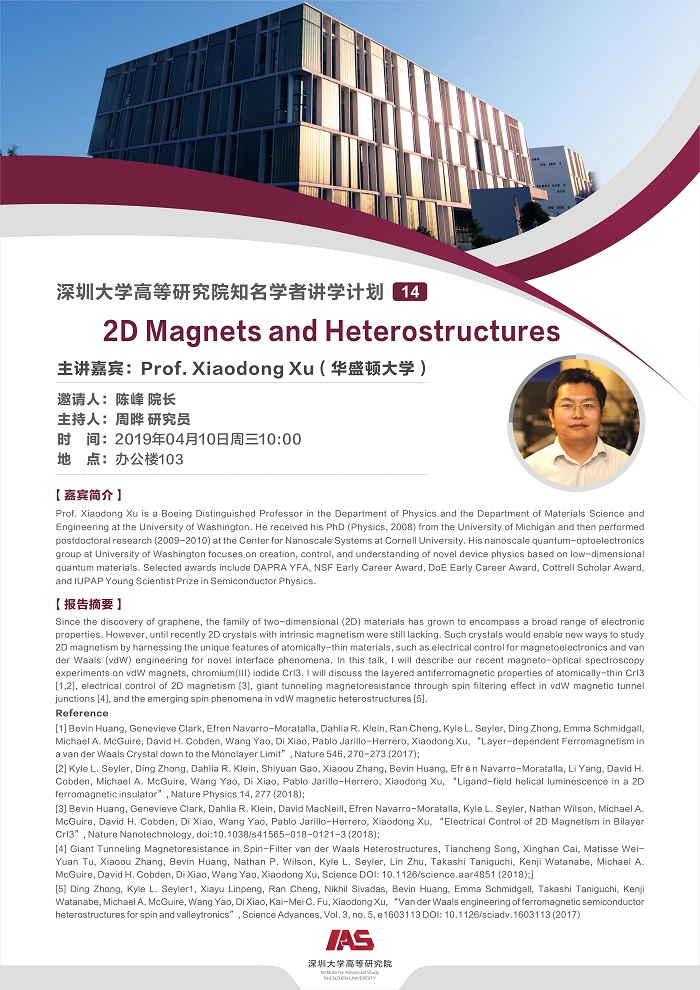Theme: 2D Magnets and Heterostructures
Speaker: Prof. Xiaodong Xu (University of Washington)
Inviter: Dean Steven F. Chen
Host: Ye Zhou, Research Scientist
Time: 10:00, April 10th, 2019
Venue: Conference Room 103, Office Building
Abstract:
Since the discovery of graphene, the family of two-dimensional (2D) materials has grown to encompass a broad range of electronic properties. However, until recently 2D crystals with intrinsic magnetism were still lacking. Such crystals would enable new ways to study 2D magnetism by harnessing the unique features of atomically-thin materials, such as electrical control for magnetoelectronics and van der Waals (vdW) engineering for novel interface phenomena. In this talk, I will describe our recent magneto-optical spectroscopy experiments on vdW magnets, chromium(III) iodide CrI3. I will discuss the layered antiferromagnetic properties of atomically-thin CrI3 [1,2], electrical control of 2D magnetism [3], giant tunneling magnetoresistance through spin filtering effect in vdW magnetic tunnel junctions [4], and the emerging spin phenomena in vdW magnetic heterostructures [5].
Reference
[1] Bevin Huang, Genevieve Clark, Efren Navarro-Moratalla, Dahlia R. Klein, Ran Cheng, Kyle L. Seyler, Ding Zhong, Emma Schmidgall, Michael A. McGuire, David H. Cobden, Wang Yao, Di Xiao, Pablo Jarillo-Herrero, Xiaodong Xu, “Layer-dependent Ferromagnetism in a van der Waals Crystal down to the Monolayer Limit”, Nature 546, 270-273 (2017);
[2] Kyle L. Seyler, Ding Zhong, Dahlia R. Klein, Shiyuan Gao, Xiaoou Zhang, Bevin Huang, Efrén Navarro-Moratalla, Li Yang, David H. Cobden, Michael A. McGuire, Wang Yao, Di Xiao, Pablo Jarillo-Herrero, Xiaodong Xu, “Ligand-field helical luminescence in a 2D ferromagnetic insulator”, Nature Physics 14, 277 (2018);
[3] Bevin Huang, Genevieve Clark, Dahlia R. Klein, David MacNeill, Efren Navarro-Moratalla, Kyle L. Seyler, Nathan Wilson, Michael A. McGuire, David H. Cobden, Di Xiao, Wang Yao, Pablo Jarillo-Herrero, Xiaodong Xu, “Electrical Control of 2D Magnetism in Bilayer CrI3”, Nature Nanotechnology, doi:10.1038/s41565-018-0121-3 (2018);
[4] Giant Tunneling Magnetoresistance in Spin-Filter van der Waals Heterostructures, Tiancheng Song, Xinghan Cai, Matisse Wei-Yuan Tu, Xiaoou Zhang, Bevin Huang, Nathan P. Wilson, Kyle L. Seyler, Lin Zhu, Takashi Taniguchi, Kenji Watanabe, Michael A. McGuire, David H. Cobden, Di Xiao, Wang Yao, Xiaodong Xu, Science DOI: 10.1126/science.aar4851 (2018);]
[5] Ding Zhong, Kyle L. Seyler1, Xiayu Linpeng, Ran Cheng, Nikhil Sivadas, Bevin Huang, Emma Schmidgall, Takashi Taniguchi, Kenji Watanabe, Michael A. McGuire, Wang Yao, Di Xiao, Kai-Mei C. Fu, Xiaodong Xu, “Van der Waals engineering of ferromagnetic semiconductor heterostructures for spin and valleytronics”, Science Advances, Vol. 3, no. 5, e1603113 DOI: 10.1126/sciadv.1603113 (2017)
About the Speaker:
Prof. Xiaodong Xu is a Boeing Distinguished Professor in the Department of Physics and the Department of Materials Science and Engineering at the University of Washington. He received his PhD (Physics, 2008) from the University of Michigan and then performed postdoctoral research (2009-2010) at the Center for Nanoscale Systems at Cornell University. His nanoscale quantum-optoelectronics group at University of Washington focuses on creation, control, and understanding of novel device physics based on low-dimensional quantum materials. Selected awards include DAPRA YFA, NSF Early Career Award, DoE Early Career Award, Cottrell Scholar Award, and IUPAP Young Scientist Prize in Semiconductor Physics.



